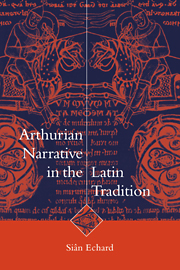Book contents
- Frontmatter
- Contents
- Acknowledgments
- Note on translations
- Introduction: Latin Arthurian narrative and the Angevin court
- 1 “The Anger of Saturn shall fall”: Geoffrey of Monmouth's Historia regum Britannie and the limits of history
- 2 “This is that Arthur”: chronicle responses to Arthur
- 3 “Are you the only uncivilized knight produced by sweet Britain?”: Arthurian episodes and knightly conduct
- 4 “Understanding the thing as it is”: De Ortu Waluuanii and the challenge of interpretation
- 5 “Dies fantastica”: the Historia Meriadoci and the adventure of the text
- 6 “When I have done you will be little the wiser”: Arthur and Gorlagon, Vita Merlini, and parody
- Conclusion: “A wise man may enjoy leisure”: The place of Latin Arthurian literature
- List of works cited
- Index
- CAMBRIDGE STUDIES IN MEDIEVAL LITERATURE
3 - “Are you the only uncivilized knight produced by sweet Britain?”: Arthurian episodes and knightly conduct
Published online by Cambridge University Press: 10 November 2010
- Frontmatter
- Contents
- Acknowledgments
- Note on translations
- Introduction: Latin Arthurian narrative and the Angevin court
- 1 “The Anger of Saturn shall fall”: Geoffrey of Monmouth's Historia regum Britannie and the limits of history
- 2 “This is that Arthur”: chronicle responses to Arthur
- 3 “Are you the only uncivilized knight produced by sweet Britain?”: Arthurian episodes and knightly conduct
- 4 “Understanding the thing as it is”: De Ortu Waluuanii and the challenge of interpretation
- 5 “Dies fantastica”: the Historia Meriadoci and the adventure of the text
- 6 “When I have done you will be little the wiser”: Arthur and Gorlagon, Vita Merlini, and parody
- Conclusion: “A wise man may enjoy leisure”: The place of Latin Arthurian literature
- List of works cited
- Index
- CAMBRIDGE STUDIES IN MEDIEVAL LITERATURE
Summary
The full-blown romances discussed in the next few chapters are rarities, and I turn now to another set of rarities, those disjecta membra of the Arthurian tradition which, while they are not freestanding Arthurian stories, nevertheless differ from the direct responses of the historians to the question of Arthur's historicity; or indeed from the direct use of the Arthurian material for chronicle history. In the Arthurian episodes which follow, Latin writers play with Arthurian fictions in the service of works that are not primarily Arthurian in focus. Johannes de Hauvilla and Andreas Capellanus use Arthurian material to illustrate modes of conduct. Hauvilla's Architrenius includes a section in which Gawain leads the army of the just against the army of the covetous. The particular choice of characters here may be attributed to the world of courtly patronage, for in this episode Johannes gives his patron an Arthurian lineage and makes him one with Arthur and Gawain in terms of openhandedness. The Sparrowhawk episode from Andreas Capellanus's De amore uses Arthurian material to present the Rules of Love, and so comes closest of the works in this chapter to echoing the preoccupations of vernacular courtly romance. The final text, an episode from John of Glastonbury's fourteenth-century Cronica sive Antiquitates Glastoniensis Ecclesie, presents a squire who demonstrates how not to behave, as well as a most pious king.
- Type
- Chapter
- Information
- Arthurian Narrative in the Latin Tradition , pp. 107 - 130Publisher: Cambridge University PressPrint publication year: 1998



